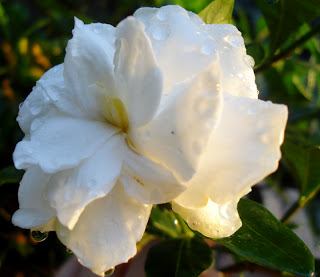Recently I discovered a Southern writer I feel is worth sharing. I first heard of Ellen Glasgow in an email from online bookseller Abe’s Books. I immediately checked my library for her work, and found a couple of books, including Barren Ground, which I just finished reading.
Ellen Glasgow was born in Richmond, VA April 22, 1873, the ninth of 10 children born to Francis Thomas and Anne Jane Gholson Glasgow. She was a delicate child, educated at home or in private schools, and read widely, everything from philosophy to European and British literature. Though she never married, she was engaged twice and carried on a long-time affair with a married man, only identified as Gerald B. in her autobiography.
Despite losing her hearing beginning in 1889, she published her first novel in 1897 (anonymously) when she was just 24 years old. She went on to publish many more novels, as well as short stories and a collection of poems. Her final novel, In This Our Life (1941), won the Pulitzer Prize in 1942 and was adapted into a movie starring Bette Davis. Her autobiography, A Woman Within, was posthumously published in 1954. Glasgow was a popular writer in her time, and hit the best-seller lists five times.
“Born into an aristocratic Virginia family, the young Glasgow rebelled against the conventional modes of feminine conduct and thought approved by her caste,” according to the Encyclopedia of Southern Culture. “The great organizing ideas of her fiction are the conflicts between tradition and change, matter and spirit, the individual and society.”
The book I read, Barren Ground, “… is a semi-autobiographical novel detailing 30 years in the life of Virginia farm girl Dorinda Oakley, who embodies Glasgow’s own conflict between Old South nostalgia and New South realism.” according to “Genesis & Apocalypse of the ‘Old South’ Myth: Two Virginia Writers at the Turn of the Century.”
Glasgow’s books were often social histories dealing with the effects of the Civil War on Virginia society. According to the Encyclopedia of World Biography, “Cruelty, greed, and intolerance were the real adversaries of mankind, she believed. Her novels led Southern fiction away from the accepted lies that the enemy was the North, the nouveau riche, or black people; they showed that the foe was not without but within.” Many of her heroines also struggled against the expectation that women be dependent and domestic.
In the preface to Barren Ground, Glasgow wrote, “In Barren Ground, as in The Sheltered Life, I felt that the scene apart from the human figures, possessed an added dimension, a universal rhythm deeper and more fluid than any material texture. Beneath the lights and shadows there is the brooding spirit of place, but, deeper still, beneath the spirit of place there is the whole movement of life.
“The book is [Dorinda’s]; and all minor themes, episodes, and impressions are blended with the one dominant meaning that character is fate.”
Glasgow’s writing vividly brings to life that “spirit of place”: “Beneath scudding clouds the plumes of the bent grasses faded to ivory. During the long spring rains, a film of yellow-green stole over the burned ground. At autumn sunsets, when the red light searched the country, the broomsedge caught fire from the afterglow and blazed out in a splendour of colour. Then the meeting of earth and sky dissolved in the flaming mist of the horizon.”
And
“Around her the farm spread out like an open fan, ploughed ground melting into wasteland, fields sinking into neglected pasture, pasture rising gradually into the dark belt of the pines. She knew that the place was more to her than soil to be cultivated; that it was the birthplace and burial ground of hopes, desires, and disappointments. The old feeling that the land thought and felt, that it possessed a secret personal life of its own, brushed her mood as it sped lightly by.”
I’m going to read more of Glasgow’s work. Have you ever read anything she’s written? Who are some of the authors you have discovered?















